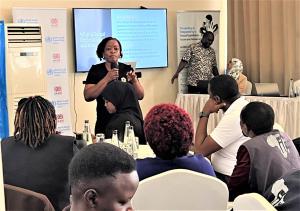Guardians of dignity: WHO's efforts to prevent and respond to sexual misconduct during the Ebola outbreak in Uganda
In the heart of every health emergency lies a silent battle, one that is fought not with syringes or stethoscopes, but with an unwavering commitment to uphold the dignity and safety of every individual. As the world grapples with the relentless waves of health crises, the imperative to shield the vulnerable from the shadows of sexual exploitation, abuse, and harassment (SEAH) becomes paramount.
Sexual misconduct violates the rights and well-being of those we serve and those with whom we serve. This is why the World Health Organization (WHO) has zero tolerance for any form of sexual misconduct, inaction, or retaliation against those who raise complaints or bear witness. Our work prioritizes the rights and needs of both victims and survivors.
As Uganda emerges from the shadows of the Ebola outbreak, WHO's unwavering efforts to prevent sexual misconduct stand as a testament to our commitment to human dignity. Through extensive trainings, collaborative partnerships, and raising awareness, WHO has fortified the frontline against SEAH. Our dedication has protected the vulnerable and empowered communities, ensuring that even in the darkest hours, the light of compassion and justice shines through.
During the just ended Ebola outbreak, WHO was at the forefront, ensuring that emergency responders stood out as guardians against sexual misconduct. WHO meticulously raised awareness on Prevention & Response to Sexual Exploitation Abuse and Harassment (PRSEAH) among frontline workers. A total of 147 responders received pre-deployment briefing, and 287 participants in WHO-hosted engagements were reached. Information, education, and communication materials, including banners, T-shirts, booklets, and posters, were distributed to reinforce key messages on PRSEAH and reporting channels.
Throughout the Ebola response, WHO Uganda collaborated with the UN interagency network on Prevention of Sexual Exploitation and Abuse (PSEA) through joint planning and implementing activities on risk assessment, capacity building, referral pathways, community engagement and reporting mechanisms.
With funding from the Government of the United Kingdom, and in partnership with the PSEA network, the WHO country office mentored 82 implementing partners and frontline workers involved in humanitarian and development responses in Kampala district. The training aimed to enhance their capacity to recognize, prevent, and respond to SEA in public health emergencies, with the expectation that trained partners would cascade this knowledge within their sectors. The PSEA network continues to provide ongoing support.
Since 2018, the UN in Uganda has reinforced the Secretary-General's bulletin on special measures for protection from sexual exploitation and abuse (ST/SGB/2003/13), focusing on risk assessment and capacity building among implementing partners to protect beneficiaries of humanitarian and development assistance from SEA. Efforts have been coordinated by the UN Office of the Resident Coordinator and various UN agencies.
“Previous public health emergencies taught us that in times of intense pressure, the risks of sexual exploitation and abuse can rise dramatically, particularly for women and children. We must not forget that the very foundation of our humanitarian mission is to protect the most vulnerable among us,” said Mr Leonard Zulu, the UN Resident Coordinator in Uganda, while opening the PSEA training for frontline workers in Kampala.
Prevention and mitigation activities benefit the entire workforce by creating respectful and safe workplaces, protecting from harm, and ensuring rapid response for the populations we serve. WHO’s dedication to raising awareness, providing education, and ensuring accountability has not only protected the vulnerable but also empowered communities to stand resilient in the face of adversity.
